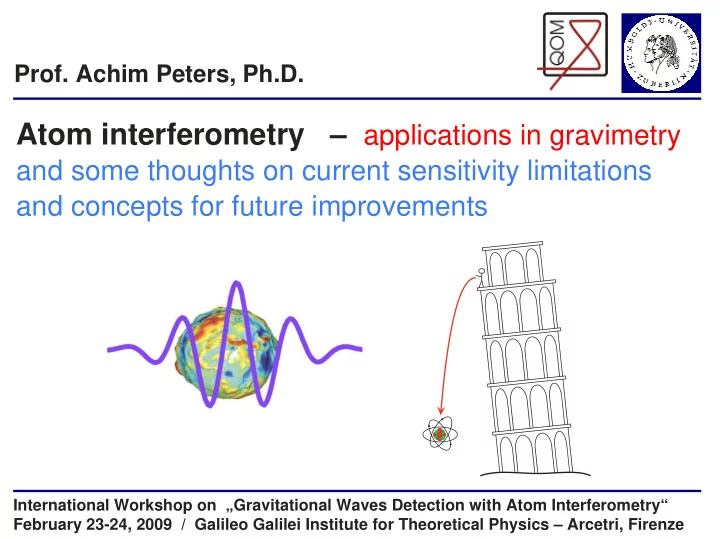

Prof. Achim Peters, Ph.D. Atom interferometry – applications in gravimetry and some thoughts on current sensitivity limitations and concepts for future improvements International Workshop on „Gravitational Waves Detection with Atom Interferometry“ February 23-24, 2009 / Galileo Galilei Institute for Theoretical Physics – Arcetri, Firenze
Inertial sensing using atom interferometers
State of Art: AI Gravimeters + Gradiometers Kasevich Gravimeter (mobile) Bias Stability: < 10 -10 g Stanford Gravimeter (non-mobile) Achieved Accuracy: 4 · 10 -9 g (?) Paris Gravimeter („mobile“) Achieved Accuracy: 1.4 · 10 -8 g Florenz INFN Gravity Gradiometer MAGIA Berlin Gravimeter GAIN Measurement of the gravitational constant G (mobile, under construction) Targeted Accuracy: ∆ G/G = 1 · 10 -4 Targeted Accuracy: 5 · 10 -10 g
Important gravitational effects
Airborne gravity gradiometery
Gravitational effects of various objects
Different types of gravimeters Noise [ g/ Hz 1/ 2 ] Drift [ g/ day] Accuracy [ g] Spring/ Mass Systems 1 · 10 -10 3 · 10 -8 N/ A < 10 -12 < 2 · 10 -10 Levitated Superconducting N/ A Spheres (Cyogenic) 5 · 10 -8 * ) Falling Corner Cubes - 2 · 10 -9 2 · 10 -8 * ) Atom Interferometer - 7 · 10 -9 *) measured in the same laboratory; noise could be a factor 10 lower at a seismologically quiet site Burris Spring Gravity Meter GWR superconducting gravimeter FG-5 corner-cube gravimeter
Main Purpose of absolute gravimeters Compare readings taken at different locations and monitor changes for unlimited periods of time Atom interferometric absolute gravimeter • Noise < 10 -8 g / Hz 1/2 (basically limited by tectonic noise) • Accuracy better than 10 -9
Stanford University atomic fountain gravimeter Laboratory atom gravimeter Vibration Isolator Raman beams Cesium atoms magnetic shield trapping beams trapping coils
Stanford University atomic fountain gravimeter
Stanford gravimeter comparison Laboratory atom gravimeter
Stanford gravimeter comparison
Stanford gravimeter comparison the environment at the time of measurement ...
The FINAQS Project (Future Inertial Atomic Quantum Sensors) Collaboration of Five European research groups IQO, Hannover Humboldt Universität, Berlin Ernst Rasel Achim Peters BNM-SYRTE, Paris Arnaud Landragin LENS, Florence Guglielmo Tino Institut d‘Optique, Orsay Philippe Bouyer
Portable atomic quantum gravimeter GAIN GAIN interferometer assembly • Compact: three ~ 1 m 3 Modules (interferometers assembly + two 19‘‘ racks for laser system and electronics) • Robust: critical components based on technology developed for the high g-loads in drop tower experiments • Mobile: designed to be „truckable“ and for use at a variety of interesting locations Targeted sensitivity: 1 · 10 -9 g / sqrt(Hz) at a SNR of 300:1 (intrinsic noise only) 1 · 10 -8 g / sqrt(Hz) at a SNR of 30:1 (under realistic vibration conditions) Targeted absolute accuracy: 5 · 10 -10 g
QUANTUS - Quantum Gases under Microgravity Drop Capsule DLR 50 WM 0346 110 m ~ 4.74 s at µg acceleration 110 m ~ 4.74 s at µg acceleration H = 2.40m Ø = 0.8 m Mass < 280 kg
GAIN – current status Laser System assembled Vacuum chamber assembled, and in Operation currently baking out
GAIN – first environmental testing Result: Laser back in lock within an hour of returning to the lab
Prof. Achim Peters, Ph.D. Atom interferometry – applications in gravimetry and some thoughts on current sensitivity and concepts for future improvements International Workshop on „Gravitational Waves Detection with Atom Interferometry“ February 23-24, 2009 / Galileo Galilei Institute for Theoretical Physics – Arcetri, Firenze
Recommend
More recommend